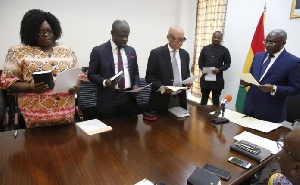 Portions of recommendations by the Short Commission was rejected by government
Portions of recommendations by the Short Commission was rejected by government
Supreme Court Judge nominee, Henrietta Mensa-Bonsu says the Justice Emile Short Commission that probed the Ayawaso West Wuogon by-election violence had no right to compel the president to implement its recommendations.
She explained that a fact finding commission like that of the Emile Short commission mostly become “functus officio” the moment they hand in their work.
“When you serve on a Commission to advise the President, you are guided by law and the rule says when you hand in your report, you are functus officio. So it’s not your duty to go chasing people to implement it. It becomes a property that Members of Parliament like you should follow up and not the Commission because it does not exist anymore and for example when judges take a decision in the court, the judge may have really sweated over the decision and it goes to appeal and it is reversed, the judge does not go on a press conference to complain,” she said during her vetting on Tuesday.
The government through its White Paper rejected most of the recommendations made by the fact-finding commission.
Government contended that the report failed to address the core terms of reference of the Commission, hence its rejection of aspects of the recommendations.
While answering a question posed by a member of the appointments committee, Alhassan Suhuyini whether she was disappointed to learn that the government had rejected most of its recommendations in the white paper, she said:“When you give advice, you hope that it will be taken but what I know of advice is that those who want it do not get it and those who need it, don’t want it.”